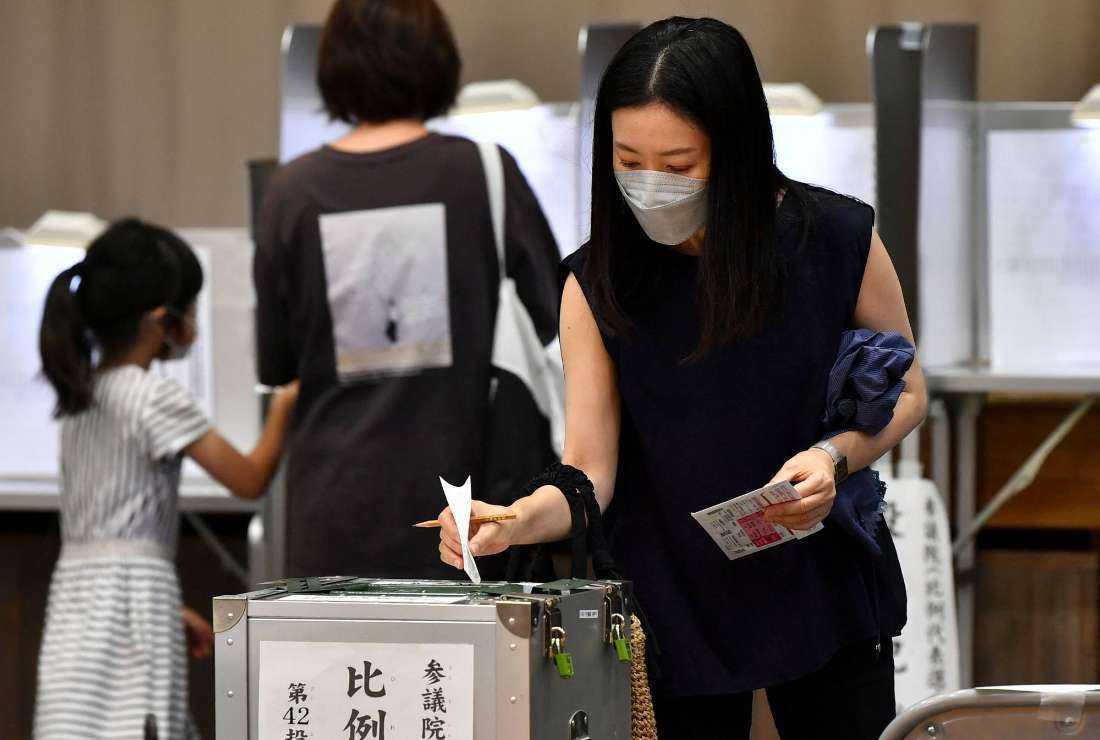
Female lawmakers make up less than 10 percent of the members of Japan's parliament

A voter casts her ballot in the Upper House election at a Tokyo polling station on July 10 last year. Only about 10 percent of lawmakers in Japan's 456-seat parliament are females. (Photo: AFP)
A youth-led project in Japan started training prospecting women to help them contest in upcoming local elections to increase female participation in the parliament and reduce gender disparity in the country, says a report.
The "Fiftys Project" was launched in 2022 and it currently assists 28 women to prepare for the campaigning and election process through study sessions and gatherings for the local election to be held this year, the Mainichi newspaper reported on March 12.
Momoko Nojo, 24, a representative of the Fiftys Project stated that the awareness about gender equality is not reflected at the grassroots level of Japanese political parties despite its top brass promoting it at the national level.
"Those on the ground are not keeping up with party headquarters' strategies. We'd like to encourage women willing to run in elections,” Nojo said.
She pointed out there is a deep-seated expectation that female politicians must raise children and do household chores while performing their political activities.
"I guess if the person were a man, they wouldn't be so mentally worn out," Nojo said.
The group provides support to women candidates irrespective of their political inclinations and affiliations.
The women supported by the group include eight candidates from the Constitutional Democratic Party of Japan, three from the Japanese Communist Party, one from the Democratic Party for the People, one from the Seikatsusha Network of Tokyo, and 15 who are contesting independently.
The group aims to first raise the number of female local assembly members, and then leverage that to raise the proportion of female lawmakers in the Diet, Japan’s parliament, and eventually prepare them to become the first female prime minister of Japan.
The group’s study sessions and gatherings include various methods that can be used by the candidates to increase their chances of winning the election.
Instructors train the women to deliver speeches, use social media, and solicit volunteer campaign staffers.
Apart from this the group also arranges question-and-answer sessions with incumbent parliamentarians which the participants found useful.
"It's encouraging that there are opportunities to share minor misgivings and worries,” said an unnamed 33-year-old woman planning to run in the ward assembly election, the Mainichi reported.
Another participant stated that she was “grateful for the opportunities to talk with people who decided to run for election around the same time and share visions for a society we'd like to achieve,” according to the newspaper.
The proportion of women versus men in the lower house of Japan’s national assembly is less than 10 percent and has not shown much increase since women got voting rights in 1946.
In the 1946 election to the lower house, 39 women were elected in the 468-seat legislature securing 8.3 percent of the total seats.
In the latest 2021 elections, 45 women were elected as representatives to the 465-seat legislature securing 9.6 percent of the total seats, an increase of 1.3 percent in the 75 years of democratic elections in the nation.
According to the Global Gender Gap Report 2022 published by the World Economic Forum Japan was ranked 139 among the 146 countries in terms of political empowerment of women.
A recent survey found more than 50 percent of Japanese women find they are in a disadvantageous situation compared to men due to gender disparity.
Observers say the lack of females in politics and high levels of gender disparity reflects Japan's strongly-ingrained patriarchal social system despite being an economic powerhouse.
Help us keep UCA News independent
The Church in Asia needs objective and independent journalism to speak the truth about the Church and the state.
With a network of professionally qualified journalists and editors across Asia, UCA News is just about meeting that need. But professionalism does not come cheap. We depend on you, our readers, to help maintain our independence and seek that truth.
A small donation of US$2 a month would make a big difference in our quest to achieve our goal.

Share your comments